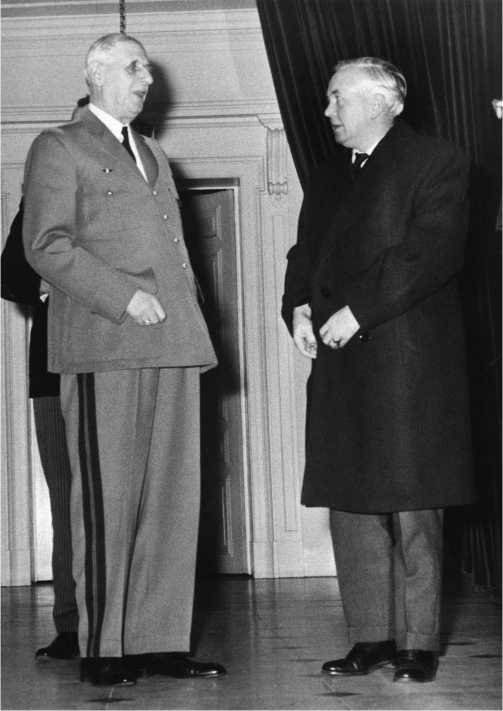A fourth interconnection between European integration and the Cold War emerges fTom British European policy, both during the years up until 1960, when the United Kingdom chose to remain aloof from its neighbours’ European policies, and during the subsequent decade when it struggled to gain belated admittance to the EEC. In the earlier period, Cold War considerations seem to have played a significant role in ensuring that Britain’s own dislike of supranational integration did not spill over into hostility towards the participation of others in such a process. Thus UK suspicions of the Schuman Plan were partially held in check by the realisation that any move which helped France to accept Germany’s rehabilitation and which eased the highly strained relations between Paris and Bonn was of immense value for Western unity at a time of high Cold War tension. Both the British ambassador to Paris and the Chiefs of Staff counselled UK benevolence towards the scheme for precisely these reasons.262 Similarly, Anthony Eden’s 1952 claim that 'on balance I had rather see France and Germany in a confused but close embrace, than at arm’s length’ is best understood in a Cold War context where Western solidarity mattered greatly and Franco-German hostility could be disastrous for Western defence.263 The origins of Britain’s stance of so-called 'benevolent detachment’ towards the efforts of its neighbours to unite - its readiness to stand aside but to let its European neighbours proceed in their chosen direction without obstructing their path - are thus closely connected to the Cold War-centred priorities of British foreign policy during the early 1950s.
It would be in their initial reaction to the EEC that the British would most clearly demonstrate the way in which their European policy could be swayed by Cold War considerations. In 1955, unlike five years earlier, London no longer felt strong enough to watch benignly from the margins as six of their continental neighbours went ahead with economic integration. Equally, the British remained certain that they could not participate in the customs union being debated by the Six. They thus briefly but disastrously experimented with a policy of actively opposing the planned EEC and of urging the Six to pursue their ideas of economic co-operation in a wider European forum such as the largely ineffective OEEC. One of the key factors which brought to an end this abortive British attempt to strangle the EEC at birth proved to be American pressure, however. It was thus only when Washington made quite clear that it strongly supported the Six in their endeavour, that the UK realised that to press ahead with its European priority of halting the formation of a European customs union might well be to endanger its Cold War priority of preserving the closeness of its ties to the United States. British pressure on the Six was immediately discontinued and London began a search for a more constructive form of engagement with the emerging EEC. Within six years this quest led to the first UK application to join the EEC.
Cold War considerations played a significant role in both Harold Macmillan’s and Harold Wilson’s applications to the EEC. Multiple factors lay behind the Conservative government’s decision to approach the Community in 1961. These ranged from Britain’s growing awareness that the British Commonwealth was unlikely to remain the tightly knit and loyally supportive group of countries that had been initially foreseen to the increased salience of exports to and imports from continental Europe in the UK’s trade figures. But central to the calculations of the prime minister in particular was the belief that Britain needed to become involved in the discussions then under way amongst the Six about extending their successful economic co-operation into the field of foreign-policy co-ordination - the so-called Fouchet Plan negotiations. Were Britain to remain excluded from an EC which acquired a more overtly political dimension, the UK would either see itself marginalised in an Atlantic relationship ever more dominated by discussions between the United States and a more united Europe or, still worse, find itself powerless to prevent de Gaulle from pushing the Six away from the Americans and British and into a new and dangerous Third Force

12. De GauUe and British prime minister Harold Wilson meeting in London in 1965. De Gaulle never gave up his opposition to British membership in the EEC.
Position between the two superpowers.264 For evident Cold War reasons, neither of these eventualities could be easily accepted by London. It was therefore vital for Britain to end its isolation fTom the Six, if necessary by accepting full Community membership. A clear strand of Cold War logic thus ran through the soul-searching which preceded the UK’s 1961 bid.
Labour’s decision to submit a new membership request in 1967 also had a Cold War dimension. Again, it would be unnecessarily reductionist to
Suggest that Cold War factors were the sole or even the most important cause of Wilson’s rethink on British EEC membership. Disillusionment with the Commonwealth and the near total collapse of Labour’s economic policy options following the sterling crisis of July 1966 were probably even more central. But there is strong evidence to suggest at least one factor that pushed the Wilson government to reconsider its European options was the diplomatic fall-out from de Gaulle’s March 1966 withdrawal from NATO’s integrated military command. For in both Washington and London, it was realised that the UK would only be able to play a central role in countering the Gaullist challenge and ensuring that no other countries were tempted to follow de Gaulle’s independent path if London could underline its European credentials by moving closer to the EEC.265 Britain’s Cold War role as the United States’ loyal lieutenant, alert to any serious threat to NATO solidarity, required a UK presence within the key European structure, the EEC, rather than a semidetached position on the margins of European co-operation. Atlantic calculations were thus once more a factor as Britain reapplied to join the Community.
A further linkage between the Cold War and early development of European integration arose fTom the way in which the East-West conflict limited the number of countries that could participate in the formation of the ECSC and EEC. One of the direct effects of the division of the European continent brought about by the Cold War was to make it impossible for any of the members of the Soviet bloc to consider or be considered for inclusion in the institutions of European co-operation. European unity after 1947 was thus pursued without the participation of Poland, Czechoslovakia or Hungary, despite the manifest European credentials of each of these countries. Also progressively excluded from the integration process were those countries which chose to stand aside from the East-West conflict, like Sweden, as well as those, such as Austria or Finland, which had neutral status thrust upon them. The Cold War thus substantially reduced the number ofcountries which could participate in the initial stages of European integration. This was almost certainly a necessary precondition of European integration’s success. For while it may be possible for the twenty-first century EU to cope with a membership of twenty-seven states, it is inconceivable that so large an entity would have been able to get off the ground five decades earlier. The way in which the Cold War division of Europe thus narrowed the list of countries involved in the opening acts of the ECSC and EEC drama was a vital element in its initial success.
Of similar utility to the early integration process was the way in which the artificial and Cold War-induced division of Germany ensured a de facto equivalence in population and geographical size between France and Germany. This proved extremely valuable in allowing the structures of European co-operation to be set up on the basis of equality of representation and voting weight amongst all four 'large’ member states: France, Germany, Italy and (from 1973 onwards) Britain. The sensitivity of the post-1990 readjustment of voting and representation rules to acknowledge Germany’s renewed status as the EU’s largest state only confirms how useful in minimising tension within the nascent Community structures the earlier limitation of its size had been.




 World History
World History









